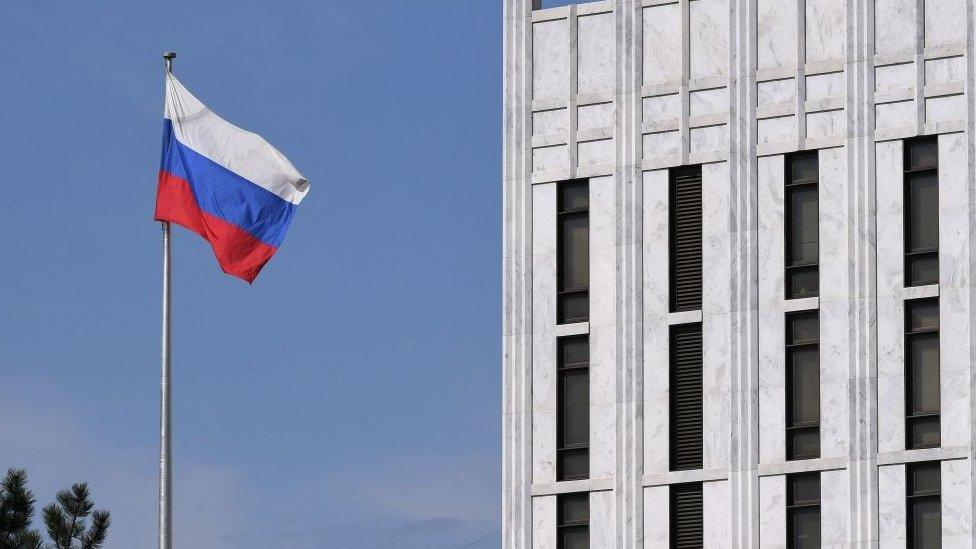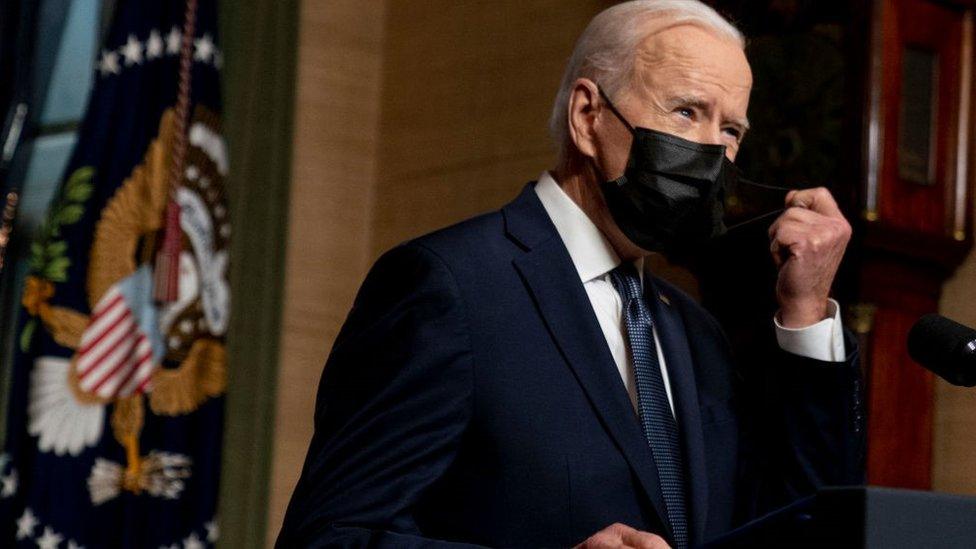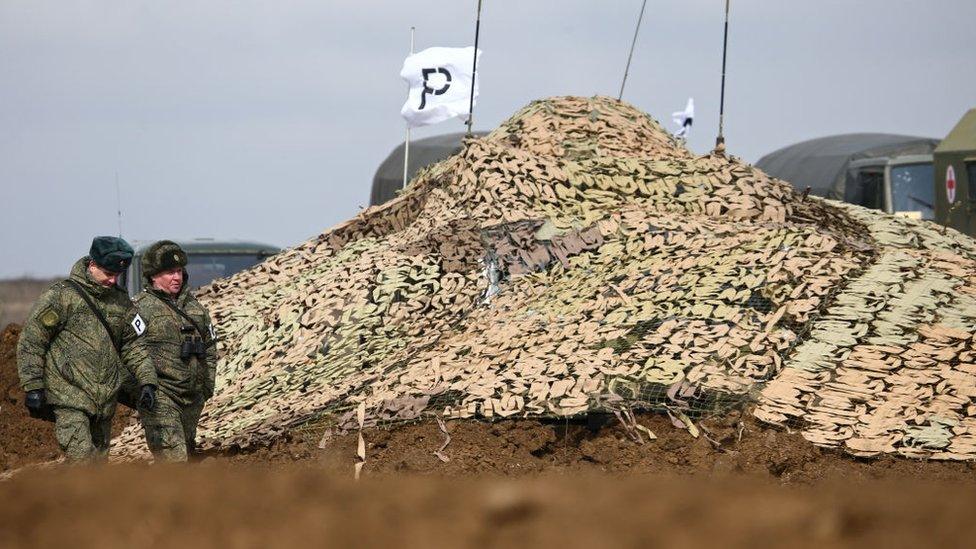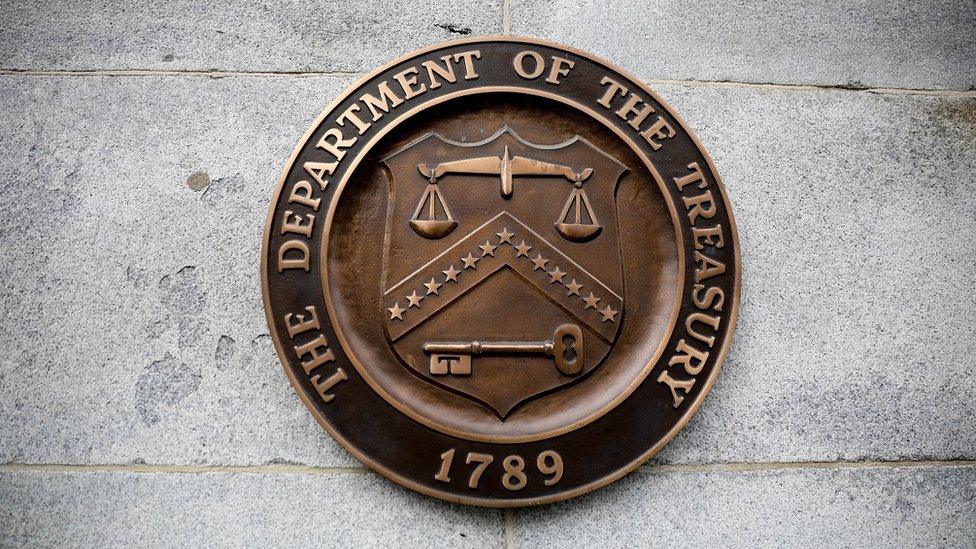Washington seeks to expose Russian intelligence activity
- Published

The Russian flag flies at the embassy's compound in Washington DC
The most surprising element of the much-trailed US response to alleged Russian cyber-attacks and other acts was the sheer amount of detail on public display.
In a flurry of statements, the US published a vast trove of information about Russian intelligence activities, including naming front organisations and individuals who have worked with Moscow in recent years.
The aim of the measures was to send a signal and to impose costs, making it harder for Russia to operate and deter future activity.
One Russian tech company which supports the Federal Security Service (FSB) but also does work for foreign governments and international companies was accused of hosting "large-scale conventions that are used as recruiting events" for two Russian intelligence services.
Another IT company was accused of conducting "research and development in support of Russia's Foreign Intelligence Service's (SVR) malicious cyber operations".
Over disinformation and election interference, one online journal was said to be directed by the SVR, Russia's Foreign Intelligence Service, despite trying to obscure its Russian origins and used to push out false narratives about US officials in the 2020 election.
Meanwhile, another organisation was said to call itself a "news agency" when actually being primarily run by a unit of the GRU - military intelligence.
More details were also published about companies and individuals, including an FBI wanted poster for Konstantin Kilimnik, a political consultant whose role in election interference are alleged to stretch from the 2016 US election through to 2020.
Diplomatic expulsions and many of the sanctions against individuals may be largely shrugged off by Moscow.
But the hope is that such public exposure can be disruptive, for instance making others less willing to do business or have contacts with some of the named companies and individuals.

Joe Biden promised a tougher approach to Russia
The US, along with the UK, also for the first time accused the SVR of being behind the SolarWinds espionage campaign where before it had only linked it to Russia.
The revelation of the SolarWinds cyber-espionage campaign generated pressure in Washington for a tough response. There is also the desire for the Biden team to differentiate themselves from the Trump era when officials sometimes had to almost bypass the President to take action against Moscow.
To maximise the impact, the US combined response to the cyber incident with sanctions over election interference in 2020 as well as other issues.
US officials say elements of the reaction will be "unseen" - indicating covert activity, perhaps some kind of cyber-disruption of the infrastructure used by Russian intelligence.
A key challenge the US had to overcome was what exactly they were objecting to when it came to SolarWinds.
While some in Congress talked of it being an "act of war", the Russian activity appears to have been a targeted attempt to steal secrets - classic espionage - and this is something the US engages in itself and, as a result, has never previously argued should be a problem.
When challenged over this, senior officials come up with three arguments why it was "reckless and unacceptable".
The first is that the scale of SolarWinds made it a threat to national security and public safety.
The second is that Russian past behaviour raised the risk that the same access to computer systems being used for espionage could be quickly switched to being used for sabotage.
The third is that it placed a huge burden on the private sector.
Those arguments are likely to be challenged (and people may ask why they do not apply to the recent Chinese linked targeting of Microsoft Exchange). And a further risk will be that the next time the US carries out an espionage campaign, Washington could have those same arguments turned back against it.
The message from Washington is that this response is "resolute but proportionate" and does not have to lead to a downward spiral in relations.
But past experience suggests all of this is unlikely to deter the Kremlin, which in recent years has viewed itself as having been engaged in a conflict with the West below the threshold of traditional war meaning the "stable and predictable" relationship Washington seeks with Moscow is likely to remain elusive.
You may also be interested in:
Experts have been warning for years that it's not a matter of if, but when, hackers will kill somebody
Related topics
- Published14 April 2021

- Published14 December 2020

- Published24 February 2023
